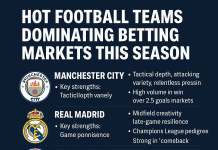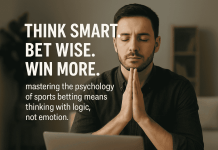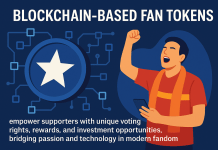
The Psychology Behind Sports Betting — Think, Don’t Feel
Sports betting isn’t just about luck — it’s a mind game. Behind every successful bettor is a disciplined thinker who understands human behavior, biases, and emotions. The difference between winning and losing often comes down to one thing: thinking instead of feeling.
This article, developed and reviewed by behavioral psychology and sports analytics experts, explores how to manage emotions, think logically, and make smarter betting decisions — the kind backed by science, not superstition.
The Science of Decision-Making in Sports Betting
At its core, betting is a psychological experiment in risk, reward, and emotion. Cognitive psychologists and behavioral economists — including Nobel laureates like Daniel Kahneman and Richard Thaler — have long shown that humans are not purely rational decision-makers.
According to Kahneman’s Prospect Theory, people tend to overvalue potential gains and underestimate potential losses. In sports betting, this means many bettors chase wins and ignore probabilities.
Professional bettors do the opposite. They treat every wager as a mathematical problem, guided by data, not desire. They apply logic, probabilities, and value assessment — the principles used by economists and behavioral scientists alike.
Key takeaway:
Emotion — The Hidden Enemy of Rational Betting
Emotions are powerful motivators — but in betting, they often lead to chaos.
When your favorite team plays, your loyalty can cloud your logic. Psychologists call this confirmation bias — the tendency to interpret information in a way that supports your existing beliefs. In betting, it’s deadly.
For example, bettors often ignore data that contradicts their gut feelings. They bet more when confident and double down after losses — a phenomenon known as the gambler’s fallacy. This illusion that “luck must change” pushes many to chase losses and abandon rational plans.
Expert bettors, on the other hand, understand emotional regulation — a psychological skill studied by researchers such as James Gross (Stanford University). They create emotional distance from each bet, treating it as an investment, not an identity.
The Power of Data and Logic
Winning bettors are part psychologist, part analyst. They rely on data-driven strategies rather than intuition.
- Statistical modeling: Professionals use probability, historical data, and performance metrics.
- Value betting: They seek bets where the odds undervalue the true probability of an outcome.
- Bankroll management: They set strict limits on how much to wager, protecting themselves from emotional decisions.
These techniques reflect the mindset of rational thinking — the cornerstone of cognitive psychology and behavioral finance. The best bettors don’t predict outcomes; they manage uncertainty better than others.
How the Brain Reacts to Risk and Reward
Neuroscience shows that betting triggers the same dopamine pathways as gambling and other reward-based behaviors.
When you win, your brain floods with dopamine — creating pleasure and reinforcing behavior. When you lose, the absence of dopamine can trigger cravings similar to addiction.
Studies from the University of Cambridge and Harvard Medical School show that impulsive betting behaviors are tied to hyperactive reward systems in the brain. The more emotionally charged a bet feels, the harder it becomes to think rationally.
That’s why successful bettors use cool thinking — staying emotionally detached and focusing on process over outcome.
H2: The Psychology of Winning — Thinking Like a Pro
Professional bettors share certain cognitive traits that separate them from casual gamblers:
- Self-awareness: They recognize when emotions influence decisions.
- Patience: They wait for the right opportunity, not constant action.
- Consistency: They follow systems, not streaks.
- Detachment: Wins or losses don’t define their next move.
- Learning mindset: They constantly refine strategies through feedback and reflection.
In psychological terms, this mindset is known as metacognition — thinking about how you think.
Common Cognitive Biases That Affect Bettors
To think clearly, you must understand how your brain tricks you. Here are some of the most common mental pitfalls in sports betting:
BiasDescriptionExample in BettingConfirmation BiasSeeking info that supports your beliefsBetting on your favorite team despite poor statsRecency BiasOvervaluing recent eventsAssuming a team will win again because they won last weekGambler’s FallacyBelieving luck “balances out”Thinking a losing streak must end soonOverconfidence BiasOverestimating your knowledgeIncreasing bet size after small winsAvailability HeuristicJudging by what’s easily recalledRemembering one big win and forgetting multiple small losses
Awareness of these biases — and countering them — is a key step in mastering psychological discipline.
Building a Winning Mindset — Think Like an Analyst, Act Like a Scientist
Experts recommend treating betting as an analytical exercise, not entertainment. Just as scientists test hypotheses, bettors can test strategies and review results.
Practical steps:
- Keep a betting journal: Record every wager, reason, and result.
- Set defined goals: Focus on process-based goals (e.g., consistent analysis), not just profits.
- Use objective tools: Models, statistics, and prediction software can reduce bias.
- Reflect weekly: Ask, “Did I follow logic, or emotion?”
These habits develop mental resilience — essential for long-term success.
Responsible Betting — The True Mark of a Thinker
True professionals know when not to bet.
Responsible betting means:
- Setting clear limits.
- Knowing when to stop.
- Viewing betting as a skill-based activity, not an escape.
According to the American Psychological Association (APA), self-control and delayed gratification are among the strongest predictors of success in any domain — including betting.
By focusing on rational thought, bettors protect both their bankroll and their mental health.
Expert Insight: Why “Think, Don’t Feel” Works
Experts agree that separating emotion from decision-making leads to more consistent, data-backed outcomes. Thinking before feeling means recognizing triggers — excitement, fear, frustration — and redirecting them toward analysis.
This approach aligns with findings in behavioral neuroscience, showing that the prefrontal cortex (responsible for rational thought) can override impulsive responses from the amygdala when trained through mindfulness and deliberate practice.
H2: Frequently Asked Questions (FAQ)
Q1: Can emotions ever help in sports betting?
Yes, but only when balanced. Emotional intuition can sometimes guide attention — but decisions should always be verified with logic and data.
Q2: How can I stop emotional betting?
Use structured systems, track every wager, and set cool-down periods after losses or wins to prevent impulsive bets.
Q3: What’s the difference between gambling and strategic betting?
Gambling relies on chance; strategic betting relies on data, psychology, and discipline.
Q4: How do experts train their minds for betting?
They study probability, track their results, practice emotional regulation, and constantly evaluate decision-making patterns.
Q5: Can understanding psychology really improve my betting success?
Absolutely. Knowing how your mind works helps you avoid emotional traps and make smarter, more consistent decisions.
Final Thoughts — The Winning Formula
Sports betting is a thrilling blend of skill, science, and psychology. But in the end, emotion-driven betting is guesswork, while thinking-driven betting is strategy.



















